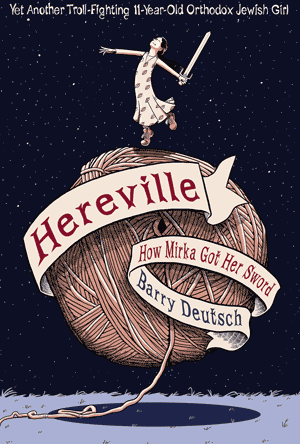
Review: Hereville
Since its release, Hereville, by Barry Deutsch, has received many accolades, from rave reviews to a Sydney Taylor Book Award. The book has an interesting blend of fantasy, girl power, and a window to another world. Robin Brenner and I sat down to discuss this book from our two different worlds.
Spunky, strong-willed eleven-year-old Mirka Herschberg isn’t interested in knitting lessons from her stepmother, or how-to-find-a-husband advice from her sister, or you-better-not warnings from her brother. There’s only one thing she does want: to fight dragons!
ADVERTISEMENT
ADVERTISEMENT
Granted, no dragons have been breathing fire around Hereville, the Orthodox Jewish community where Mirka lives, but that doesn’t stop the plucky girl from honing her skills. She fearlessly stands up to local bullies. She battles a very large, very menacing pig. And she boldly accepts a challenge from a mysterious witch, a challenge that could bring Mirka her heart’s desire: a dragon-slaying sword! All she has to do is find—and outwit—the giant troll who’s got it!
A delightful mix of fantasy, adventure, cultural traditions, and preteen commotion, Herevillewill captivate middle-school readers with its exciting visuals and entertaining new heroine.
Esther: I first read Hereville last summer in ARC form. I remembered the webcomic, but had never really kept up with it. I was glad to see it was coming out in book form, and read the book in one sitting. (OK, I know that’s not so hard for one comic, but I’m not a one-sit-and-finish a book or comic type of gal.) I thought the book was hilarious and delightful, but there was a niggling feeling in the back of my mind that kept thinking… what everyone is going to think about Orthodox Jews. While the book is not at all derogatory, the way some of the things are portrayed must make an outsider think the world is so bizarre. My cousin was staying by me at the same time, and she thought the same exact thing. We kept focusing on the passage where Mirka’s family is preparing for the Sabbath and they are tearing toilet paper. Because tearing toilet paper on the Sabbath is considered work. It’s true and it’s accurate. But it’s a bit more complex than that… and superficially it just sounds nuts. Turning a light on and off is work? Tearing is work? Doesn’t sound like back breaking labor to most folks.
What were you thinking when you read this book? Did you even take notice of these things?
Robin: I heard of Hereville many months ago and was encouraged by many folks to pick it up, and I’m so glad I did! Mirka is just my kind of heroine—smart, daring, and at the same time stubborn and more fragile than she lets on. I read Hereville first as an ARC as well and then later re-read it in its final hardcover form.
It’s interesting that you bring up the question of how the traditions and truths are represented, especially by someone not a part of the community. I am perhaps not the best reader to ask in terms of reacting as if something came off as too oddball—I grew up in Boston and my best friend growing up was Jewish (although not Orthodox). As I went through life, attending a high school where half the population was Jewish and we got the High Holidays off and now working in a town where a significant part of the population are Orthodox Jews, I was exposed to the levels of faith and practice that exist. I am frequently unnerved by the idea that most people in the US didn’t grow up in a similarly diverse environment.
For me, as both an outsider to the community and from a household that was not practicing any religious tradition except a vaguely Christian following of holidays, Judaism in general just seemed to be another one of the many possibilities I saw around me. When I learned about different aspects, like what not doing work on the Sabbath actually meant in practice in modern times, it seemed no stranger to me that the Roman Catholic practice of confession or their belief in transubstantiation. For me, at least, all communities and religions have aspects that make them a bit head-scratching, I guess, but I have always kept the perspective that it’s what a person believes and, while I’m curious to understand what it means, I’m not going to think anyone is strange for their beliefs.
I hope that a book like Hereville does a good job balancing the truths of the community, although of course the town itself is a bit of a fairy tale, and demonstrating what’s normal there without bonking readers over the heads with lessons to be learned. I hope it encourages an awareness and acceptance of difference and prompts the right kinds of questions from readers. I actually wondered if the fairy and folk tale aspects, with the witch and the talking pig, might muddle things for some readers who might think that more of it is fantasy than it actually is. A good opportunity to educate, I say!
I’m curious about the readers you may have seen pick this up, Esther. Do you have it in your school? What have the reactions been from the younger readers you know or have seen pick it up? It goes out frequently in my town and from our library, although it’s aimed at a slightly younger audience than I normally see in the Teen Room. I’ve found it’s been appealing to tweens and have yet to see anyone put it down once they’ve picked it up.
Esther: I’m glad you picked up Hereville to read, because what it boils down to is that this is a great book. The characters are well drawn. Mirka is spunky and likable. She is a female character that young girls can look up to. In a way, the characters are so well developed that all the rest, is almost tangential. Except that the traditions of Orthodox life are so much a part of the story… which really talks to how it is with many Orthodox Jews, because religion is just part of the fabric of their lives.
As to your question…. I’m embarrassed to say I didn’t get it into my library. I know I ordered it, but sometimes titles we order don’t come in because of limits to the purchase order or titles are out of stock. (I’m sure you know about that) But with my tiny budget, sometimes great titles get lost. On the other hand, the review copy has been sitting around my house for a while and my teenage sisters-in-laws liked it a lot. And the most surprising reader was my mother-in-law. This was her first graphic novel. Her comment was that she couldn’t imagine the story being told any other way. The story was perfect for the format. And I have to agree with her. Sometimes, I read a comic and I’m concentrating more on the words than the pictures, because the book didn’t need the pictures. Sometimes the opposite is true. But here I needed it all. The words and pictures were married to each other. Like a perfect union, one wouldn’t have worked without the other.
I found your comment on the town being sort of a fairy tale interesting, because on some level that went over my head. My thoughts kept gravitating to the odd sort of combination Deutsch had drawn of an old shtetl and a modern-day town. After all, in a shtetl electricity wasn’t always prevalent, college wasn’t much of a thought, and the houses were mostly not that spacious. And even with this odd little mix, he pulls it off.
Robin: I agree with you about how well integrated the images and words are. Deutsch clearly has the skill to know how to weigh each aspect of his work so that part of the story is text and part is image and both are necessary to full understand (and feel!) the story.
I think my favorite moments are the more internal ones for Mirka—her dream of her mother, for example. There’s something just so welcoming and true to the feeling of dreams represented in that instant that it felt very honest and real. I also really adore the witch, just for being a strong character. I fear many modern presentations of fairy and folk tales lead us to believe the “bad” guys are very one-note, evil creatures. I’ve always preferred the clever opposing figure, the gatekeeper who must be overcome with wit and skill. After all, how much more fun is it to have a hero or heroine who triumphs with smarts and spunk than just with brawn? But I think my scholarly, bookish childhood self (who always dreamed of being a knight) is showing. 🙂
Any other questions or thoughts on this?
Esther: It’s interesting you bring up the witch, because I wanted more of her. I’m really curious about her. Is it me, or did you notice any similarity in the way the witch and Mirka’s stepmother are drawn? I believe there is a sequel coming out and I hope that relationship is explored more in depth.
I was glad you mentioned Hereville in your Question Tuesday column, Window and Mirrors. And while I do believe Deutsch gives readers a window to some of the ins and outs of Orthodox Judaism, I don’t believe he captured its essence. He barely touched the surface. It goes back to my earlier example of tearing being work on the Sabbath. The Sabbath is more than not turning lights on and off, and the frenzy of preparation for the 3 meals, because you can’t do more than warm food on the Sabbath. There’s a deep spiritual level to the day. I’m not sure one can capture it in images and words unless they’ve lived it.
Robin: I definitely noticed the similarity between the witch and Mirka’s stepmother. Clever ladies gotta stick together, right? I also found it refreshing that, for lack of any less blunt way to say it, folks in Hereville but especially Mirka’s stepmother and the witch, are far from beauties. They’re striking, and not horrible caricatures, but they’re not intended to be attractive. Everyone in the town is realistic and more ordinary looking than I’ve seen in a comic in a long time. It’s just…refreshing.
Why do you think that the book was restricted in representing the spiritual importance of the Sabbath? Was it too short a time period? Addressed too simply? I seem to remember that the story kind of skips over an actual representation of the ceremonies of the day, and I wondered if Deutsch decided he needed to stick to the story line and couldn’t create an aside without disrupting the flow of the story. At least if we’re getting more, we can hope for a richer, more in-depth picture of the community over time, something I would dearly love to read.
Esther: Knowing that you realized the similarities between Mirka’s stepmother and the witch has added a level of excitement for the sequel. I really thought I was imagining it at first. I wondered why Deutsch decided to make Mirka’s stepmother and the witch so ugly, but I never read too much into it. Most of the characters are plain and ordinary. It was a nice, real touch.
Back to the discussion on whether or not Deutsch captures the essence of the religion: He does skip over many of the rituals, but it’s more than the rituals. The reality is there have been volumes written about the Sabbath so a comic really can’t get it all. But I think the simple answer is, if my research is correct, Deutsch didn’t grow up in an Orthodox Jewish home. Research can only take you so far. He can portray it. He can get the nuts and bolts right. No one I’ve encountered who has read it and is Orthodox was in the least bit offended. (Only one mistake was caught, which I’ve been told by an editor at Abrams that it was already corrected in the 2nd printing. I did catch something else, that wasn’t an error, but an inconsistency. Deutsch intersperses Yiddish throughout the text, but when everyone wishes each other a good week at the conclusion of the Sabbath he used the Hebrew expression, Shavuah Tov, instead of the Yiddish one, Gut Voch. But it’s really minor and again not incorrect just inconsistent.) But to get off my tangent, to get the spirituality of the day and of the religion I think you have to live it.
I probably could do a lot of research on the Muslim religion and incorporate a Muslim character and their traditions and rituals into a story, but I don’t think I could get the essence of the religion through research. The essence/spirituality of religion comes from living it.
Robin: I definitely see your point. For my part, I can’t believe that someone can’t represent something they haven’t lived (that would make a lot of my favorite books ring false, and I don’t think they do.) I think you can get a sense of faith and spirituality without having come from the same point of view—see Craig Thompson’s Habibi for a work that I think does that very strongly (although it is very much not for kids!) and looks at the threads between Christianity, Islam, and Judaism in a profoundly moving way.
ADVERTISEMENT
ADVERTISEMENT
I can see the criticism that Deutsch didn’t manage to do that here, but I do believe he could do it, and that comics could represent it, if that was his goal. It may be rare, but it is possible.
Esther: I guess it goes back to that age old debate: Can someone write about a culture (even though I don’t consider religion culture) that is not their own?
Robin: That is always the question. I always err on the optimistic side, and think that it is possible. But I’m also not part of this particular community, so I wouldn’t speak for them (or you!) in whether it works or not.
This reminds me of one of my favorite comments about getting stories right, in this case referring to the idea of adapting a novel to a screenplay. Anthony Minghella (and I’m paraphrasing) said that adapting a novel into a film should be most like jazz—you take the theme of the original and develop a riff off of it. You capture the spirit, not necessarily the note by note sequence. I feel the same way about writing about what’s outside yourself: If it resonates and feels true to the spirit, then it should be possible and will work for readers. It sounds to me like you feel it didn’t capture the spiritual spirit of the day, and that’s certainly a valid critique. I would feel (and have felt) just as critical of representations of communities I’ve been a part of (say, women’s colleges and life), and so I have no doubt there are moments that jar or didn’t feel right. I guess the question is also whether what he gets right outweighs what feels off—do you think it does?
Esther: It’s funny, whenever the discussion about whether or not someone can write about a culture that isn’t their own comes about, I’m never sure what to answer. I’ve always been on the fence, because I do feel that you can learn about a culture that isn’t your own and then depict it in some shape or form. But in the case of Hereville it doesn’t ruin the effect of the book. Deutsch got all the nuts and bolts of the religion. He captured a lot of the exterior. What I felt was that he didn’t (and I don’t think he can unless he experienced it himself) was to capture the spirituality of the religion and in particular the Sabbath day. I don’t think of it is a criticism but a reality, because Deutsch was upfront in his interviews that he didn’t grow up in an Orthodox home. He never lived an Orthodox Jewish life. So it’s not fair to think that he could get that layer of it right. Then again, he didn’t get the layer wrong. It’s just not there.
That said it never ruined the book for me. I don’t think I even put my finger on it, until I read your Question Tuesday Post: Mirrors & Windows.
Thanks for a great discussion Robin! I’m really looking forward to the sequel (and finding out what the relationship is between Fruma and the Witch!)
Filed under: Reviews
About Esther Keller
Esther Keller is the librarian at William E. Grady CTE HS in Brooklyn, NY. In addition, she curates the Graphic Novel collection for the NYC DOE Citywide Digital Library. She started her career at the Brooklyn Public Library and later jumped ship to the school system so she could have summer vacation and a job that would align with a growing family's schedule. On the side, she is a mother of 4 and regularly reviews for SLJ. In her past life, she served on the Great Graphic Novels for Teens Committee where she solidified her love and dedication to comics and worked in the same middle school library for 20 years.
ADVERTISEMENT
ADVERTISEMENT
SLJ Blog Network
Name That LEGO Book Cover! (#53)
Cover Reveal and Q&A: The One and Only Googoosh with Azadeh Westergaard
Fighting Public School Book Bans with the Civil Rights Act
Take Five: Middle Grade Anthologies and Short Story Collections
ADVERTISEMENT

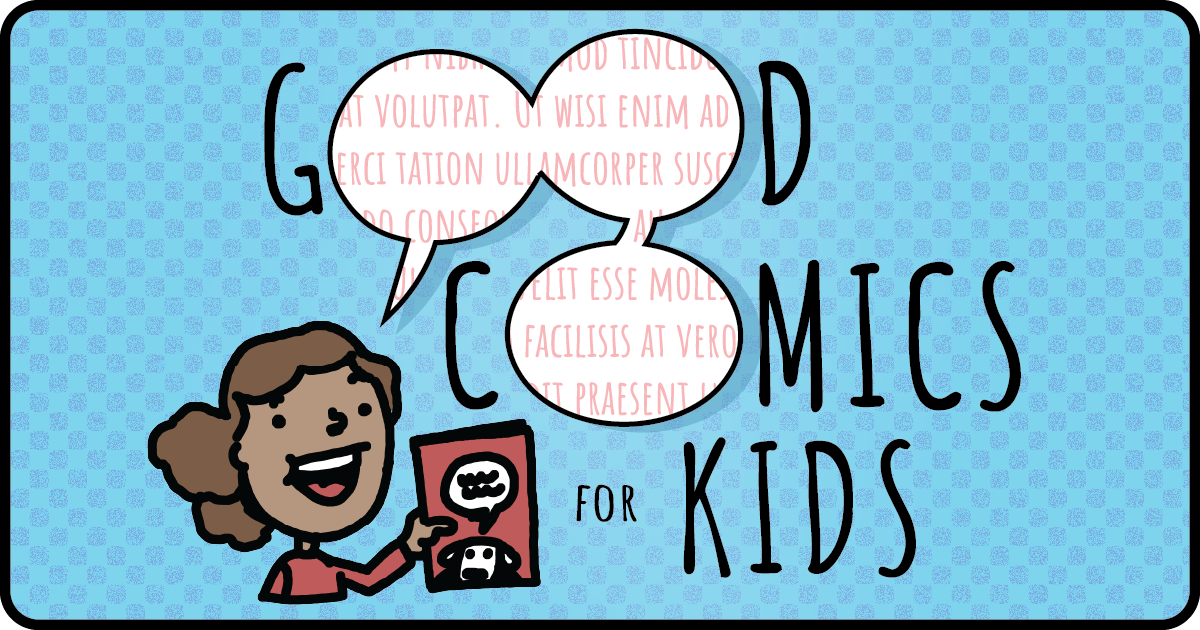


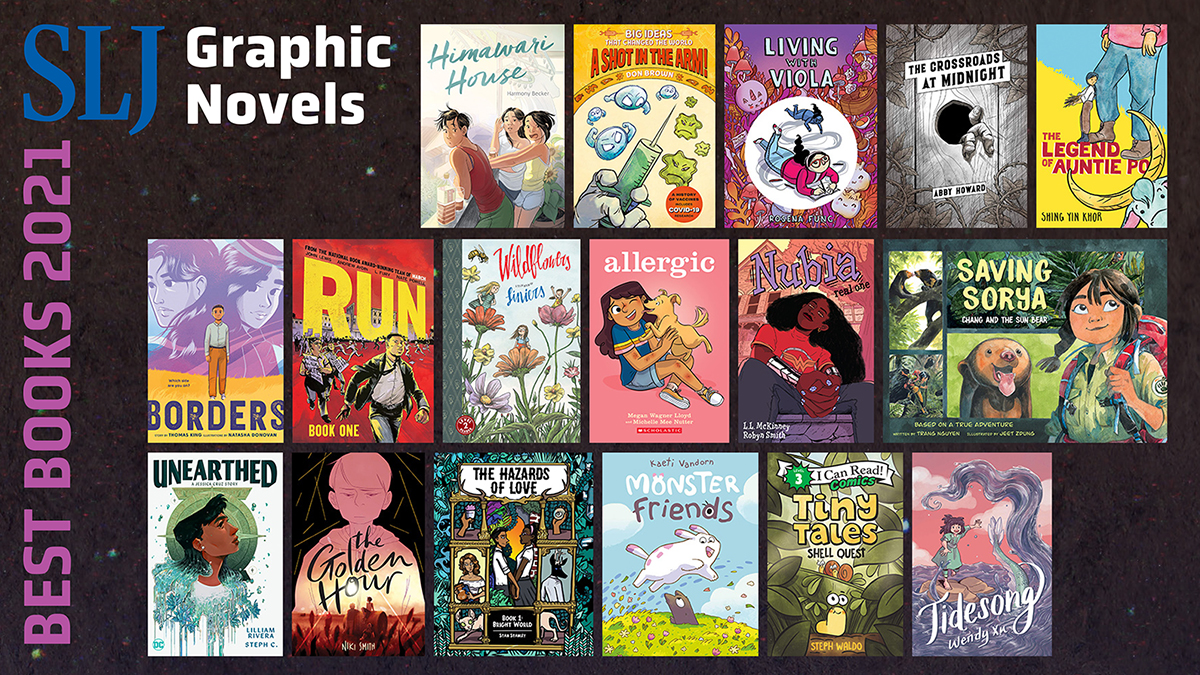
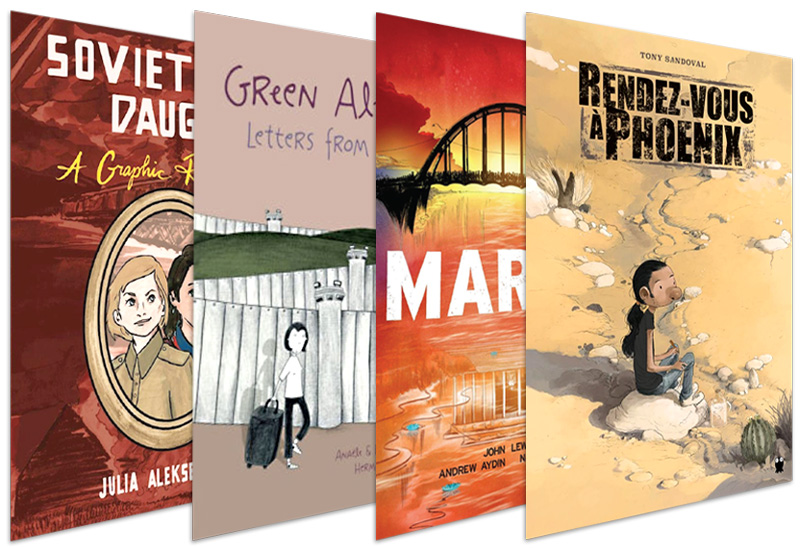


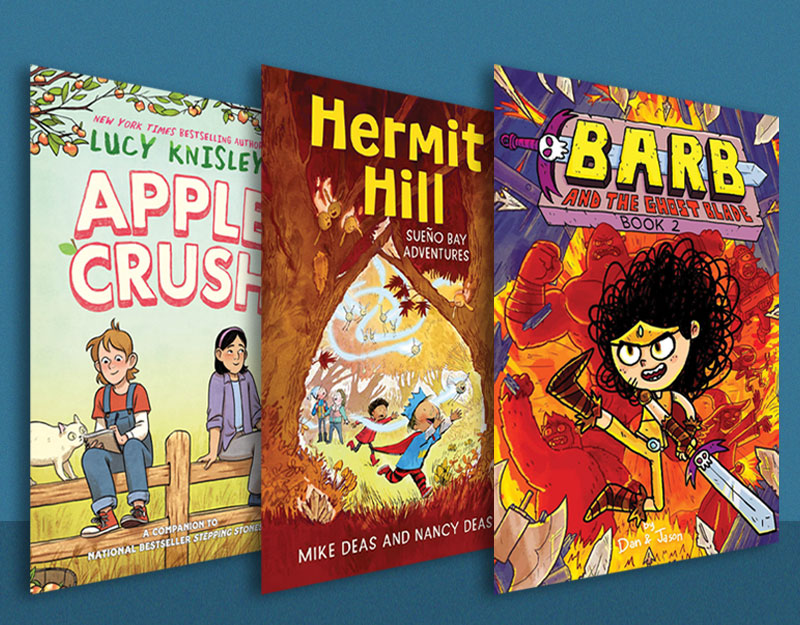
Thanks so much for this! I really enjoyed reading this.
Esther, please get in touch with me; I’ll gladly donate a signed copy of Hereville to your school library.
I’m afraid the first sequel may disappoint you both; although both Fruma and the Witch appear, we don’t learn anything new about the relationship between them in the second book. In my mind, the Hereville series extends over many books, and there are important things Mirka won’t learn about her stepmother until she’s older.
I think you two accurately put your fingers on something Hereville doesn’t do, which is attempt to depict what it’s like to really experience a faith. To do that would have been a lot more ambitious than what I intended with Hereville, and might have made it a better graphic novel; but then again, it might have made it something more than I could accomplish!
I can tell you that the Shabbos sequence in book 2 doesn’t really try to get at the spirituality of it, either. Perhaps in book 3? We’ll see.
I agree with Robin; I think it’s very possible for an artist to depict a spirituality they’ve never shared (Habibi was the same example that came to my mind!). Depicting the spirituality of Shabbot wasn’t what I’m going for in Hereville (as you understood), but I hope I’ll be making comics for decades to come, and that’s something I’d love to do someday.
Again, thank you so much for posting this smart discussion. It’s a real thrill, as a cartoonist, to read something like this about my work.
Let me say that I am an Orthodox Jew, and that I really loved how it’s portrayed. Yes, it could be done in a way that could strive to capture the essence of Shabbos. But I am content – thrilled, even – to have a story about my coreligionists that neither demonized nor beatifies, that shows them – us – as just people. Never mind that Mirka is the sort of character we need more of, someone I would show to girls from all backgrounds and say, “you can be like her. In fact, you probably are already.”
@ Barry, I’m thrilled you enjoyed the discussion! Robin and I were going back and forth for a while and probably could have kept going, but we felt like it was time to post something!
I am disappointed that we won’t learn more about the witch and Fruma. But I can be patient.
As for whether or not someone outside a culture/religion can depict the spirituality they never themselves experienced… I’ve never tried it. But I’m willing to ‘argue’ again when you try in volume 3 😉
@Simon, I love Mirka and I love the story! So I hope it doesn’t come across like I don’t. I absolutely agree that we need more characters like Mirka in both comics and prose literature.
No one I gave the book to, including myself, ever felt this did anything but simply portray some of the bits and pieces of living an Orthodox Jewish life. Actually, perhaps in my discussion with Robin, I didn’t give Barry Deutsch enough credit for actually showing no bias or judgment.
I just finally got to check in on the comments. I’m so glad to see the feedback. 🙂
@Barry I’m so glad you enjoyed reading the discussion (hopefully as much as we enjoyed having it in the first place.)
@Simon I agree that is is incredibly important to have representations of all kinds of people in media, and comics does (as a whole) frequently lag behind other media. Hereville has meant a lot to my community here near Boston, and I’m very glad to be able to point out a title the reflects so many members of our town and does so honestly and humorously.
Simon, obviously I’m very happy you feel that way.
This may sound bizarre, but a lot of my thinking was guided by asking myself what Mirka herself would say if she could read my comic. I tried to depict her culture and community in a way that she’d find respectful. (Of course, she’d be very annoyed with how I depicted her personality — I do NOT have that bad a temper!, she’d yell at me! — but I can live with that.)
I heard from some Orthodox kids, and a bunch of Orthodox parents, that it’s really special for them to find a fun comic that reflects their own life in some ways. That was one of my goals for Hereville, so I’m always thrilled to hear it.